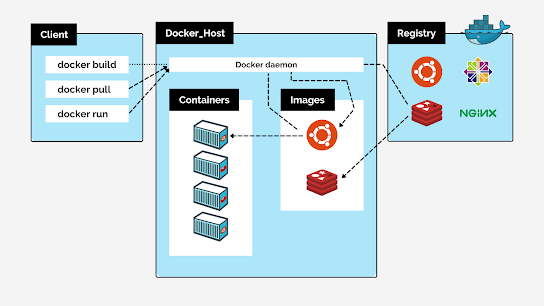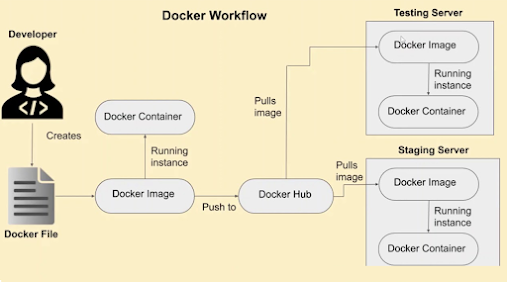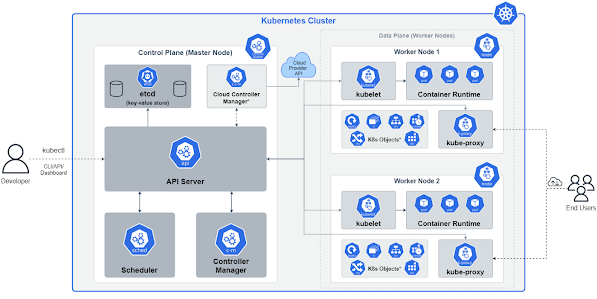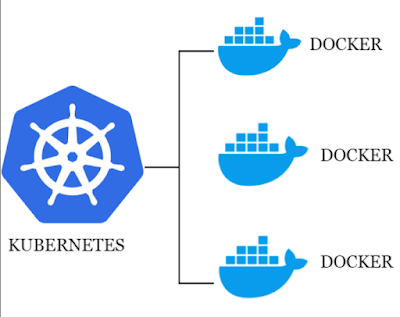Let's start with Docker first.
Docker creates virtual containers that can operate on any Linux host and contain an application along with all of its dependencies. We call them containers because of this but they are not virtual machine and they don't use Hypervisor as shown in following diagram which clearly highlight the difference between container and VMs:
What is Docker? What value it provide?
A docker is a platform for building, running, and shipping applications in a consistent fashion. In other words, if your application is running on a Windows platform it can be also made to run on Linux or Mac with the help of dockers.
Being a developer you must have encountered this problem i.e. your app runs seamlessly on the windows platform but it is facing some challenges while running on other platforms or operating systems. This may be due to
Software version mismatch.
Missing files.
Configuration settings.
Here comes docker in the picture. It packages your application along with all the configurations it needs to function. We can then take this package and run it on any machine that runs docker. It also eliminates the need of setting up the application environment for a new developer.
Docker Architecture
It uses client-server architecture hence it has a client component that talks to the server using REST API. Here the server recognizes as Docker Engine which takes care of building and running docker containers.
It is noted that a container is a special process that consumes an application image (configurations) and runs it in isolation
Docker workflow
It starts with an application. The application can be written in any programming language such as Java, Python, PHP, JavaScript, etc. Next, we add a Dockerfile to it, which contains all the configuration that a docker needs while creating an image.
The image we just build knows everything that our application needs while running it in an unfamiliar environment such as
Operating system.
Environment variables.
Software’s runtime environment (e.g. Java 11 or Java 17).
Libraries that the application needs during its lifetime.
Application files.
Once we have an image, we give it to Docker to build a container out of it. As mentioned earlier a container is a process that has everything an app needs to run from the image we provide. That’s how a container runs an application in any given environment.
What is Kubernetes?
On the other side, Kubernetes is a technology for container orchestration. It is an open-source platform that is used for managing and scaling a containerized application. It is worth noting here that, Kubernetes was developed by Google because they require a way to run a large number of containers efficiently.
Later in 2014, Google made it an open source, and now it is widely regarded as an industry standard orchestration platform for the deployment of distributed applications.
Kubernetes consolidates several containers into a single group that it manages on the same host in order to reduce network overhead and increase resource usage effectiveness. An app server, a Redis cache, and a SQL database may all be parts of a container set. When utilising Docker, each container houses a single process.
A DevOps team may instruct Kubernetes on how to assign the required resources in advance rather than having to manually manage each container in a cluster.
What Kubernetes offers
Health monitoring.
Abstraction of Infrastructure.
Increase DevOps efficiency.
Deployment automation.
Load balancing.
Here is a nice diagram which shows a Kubernetes cluster with key kube components:
Docker vs Kubernetes
So far, we have understood both Dockers and Kubernetes offer unique advantages. Docker and Kubernetes are both production-grade container orchestration technologies. The notable distinction between Docker and Kubernetes is, one is a container orchestration that manages containers, whereas the other one is a technology that uses for operating containers.
Remember containers are not created by Kubernetes. Instead, it depends on container technology, like Docker.
A reasonable analogy is to think of Docker containers as "apps" that you installed on the "operating system," and Kubernetes acts as the "operating system".
Here are few more differences between Docker and Kubernetes:
|
DOCKER |
KUBERNETES |
|
Installation |
|
|
It is easier to install. |
Relatively
complex to install or set up. |
|
Scaling |
|
|
It requires manual scaling. |
It
supports auto-scaling. |
|
Learning |
|
|
It is easy to learn. |
Due
to its large echo system, the learning curve is high. |
|
Load Balancer |
|
|
Auto load balancer |
The
load balancer needs to be set up manually. |
When to use Docker and Kubernetes?
If you are a small firm, where you develop and manage infrastructure on your own. Docker will be a good choice. It demands less setup and configuration compared to Kubernetes while it provides the same advantages as Kubernetes, such as load balancing between the containers inside the cluster, automated service scaling up to your desired state, and much more.Docker is a wonderful option if you just have a few active workloads if you don't mind maintaining your infrastructure, or don't require certain functionality that Kubernetes provides.
Coming back to Kubernetes, even though it is relatively difficult to set up at first, Kubernetes does offer whole lots of functionality. In addition to it, Kubernetes offer massive support from open-source communities and tech giants like Google, IBM, etc.
If you or your team is managing a lot of workloads, and need cloud-native coordination, and have several teams working together in your organization, Kubernetes is surely the platform you should consider.
- The DevOps Developer RoadMap
- 10 Free Docker Courses for Java and DevOps Professionals
- 5 Free Selenium Courses to Learn Automation Testing
- 10 Docker and Kubernetes Courses for Programmers
- 6 Maven Courses for Java Developers
- 10 Things Java Developers Should Learn in depth
- Top 5 Courses to Learn Jenkins for Automation and DevOps
- 7 Free Online Courses to learn Kubernetes in depth
- My favorite courses to learn Amazon Web Service
- 13 Best DevOps Courses for Senior Developers
- My favorite courses to learn DevOps for experienced
- 10 Free Courses to learn AWS and Cloud for Programmers
- 7 Free Courses to learn Selenium for DevOps
- Top 5 Books to learn DevOps in depth
- 15 online Courses to learn Docker, Kubernetes, and AWS
Thanks for reading this article so far if you like Docker vs Kubernetes explanation and find this article useful then please share it with your friends and colleagues. If you have any questions or feedback then please drop a note.





No comments:
Post a Comment
Feel free to comment, ask questions if you have any doubt.